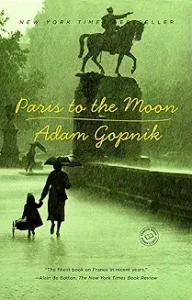Paris to the Moon by Adam Gopnik 2000
I had read this delightful and delicious book about Gopnik and his young family’s adventures in Paris at the end of the 20th C a number of years ago, so I was overjoyed to find it on the shelves of our Paris apartment when we arrived on Rue Ampere. Reading it again, I found it even more wonderful as I could actually visit and encounter many of the scenes Gopnik described.
Gopnik, one of the great non-fiction commentators and essayists of our time, has combined a tale of family with Janet Flanner-like observations of Paris to make a great read. His wit and charm, usually expressed as an ironic comment in parentheses among his concise and expressive prose, keeps the commentary moving along swiftly, even when he’s describing a serial bedtime story he created for the 4 year old Luke Auden.
It’s the late 1990’s and Gopnik and his wife, Martha, decide to decamp from Barney-land, otherwise known as NYC, to Paris where they had lived as young students. Finding an apartment, learning how to use French appliances, shopping at department stores, cooking, and other mundane everyday activites are brought to vivid life with great humor and insights by the author. As an example, he contrasts Americans view of the Impressionists (wow!) with the French insouciance about them and the French excitement about jazz with the Americans’ dismissal of it. And the contrasts fill the book as he keenly characterizes the French as calm, observing insiders dealing with the implicit tension between the French civilization and culture and their bureaucratic, administrative need to control and document everything. As a perfect example of this, we were chatting with the owner of a tiny jewelery store opposite the Luxembourg Gardens and she said, “Parisians live in paradise, and complain that they live in hell.”
Here’s an example of Gopnik at his funniest as he explained why they had moved to Paris at least in part to have a French baby who might turn out to be another son: “Also, she (Martha) was worried about having to succumb to the New York social law that compels you to name your sons exclusively after men your grandfather used to take a schvitz with. In our New York circle of under-tens we aleady had in addition to the requisite Maxes, a Harry, a Joe, a Sam an Otto, and a Charlie—the whole senior staff of Benny’s Market: Lowest Prices in Town.”
The book is filled with this kind of humor and sharp observation. Even 20+ years later, it reads and rings true. If you love Paris, or New York City, or both or if you’re a fan of excellent writing, this is a book you’ll enjoy.



